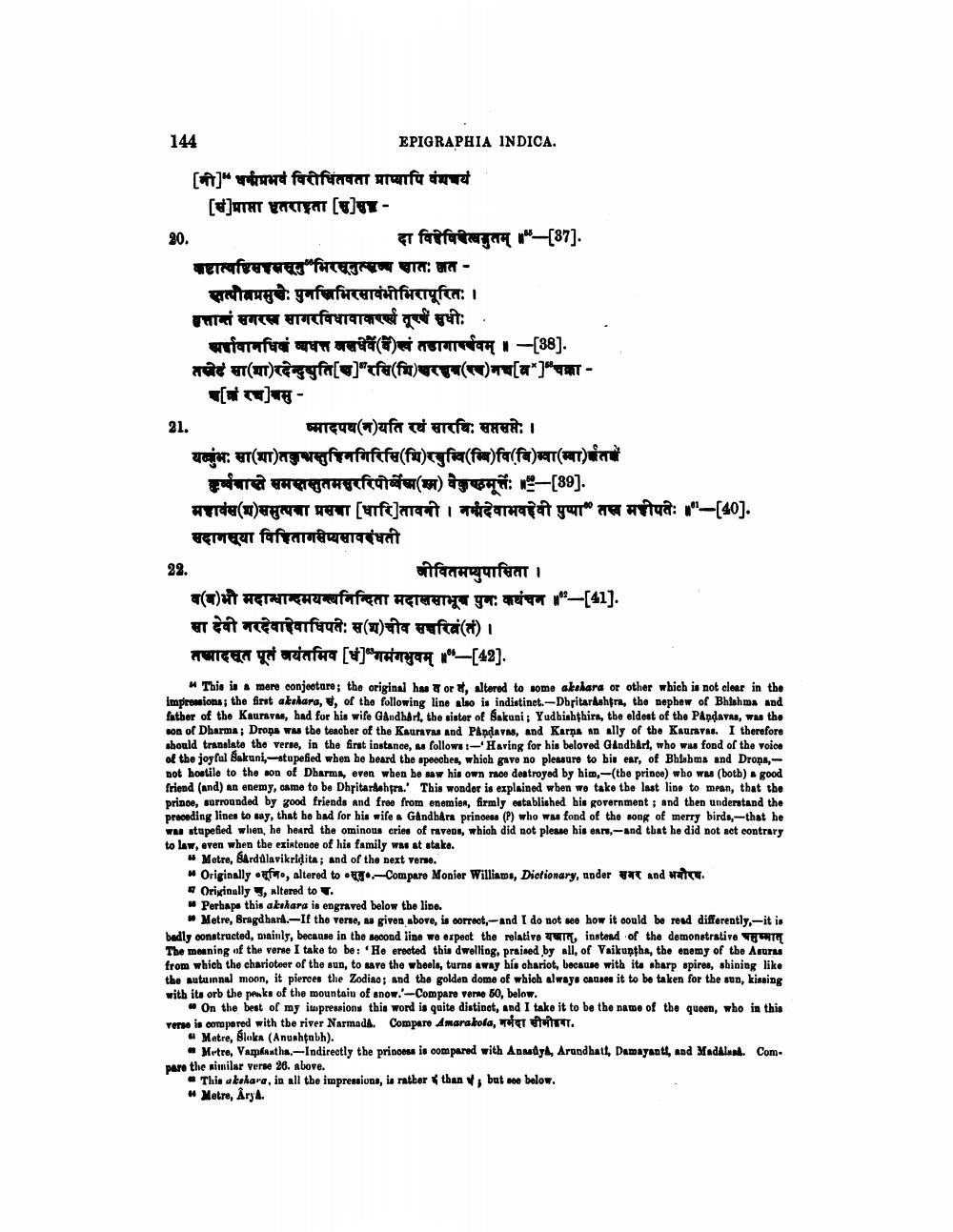________________
144
EPIGRAPHIA INDICA.
20.
[नी]" मभव विरोधितवता प्राप्यापि वंशचर्य [4]प्राप्ता धतराङ्गता []
दा विहेषिरखजुतम् ।"-[37]. बष्टात्यधिसामनु"भिरसूनुत्सल्य सातः बत
सत्यौवप्रमुख: पुनखिभिरसावंभीभिरापूरितः । उत्तान्तं समरस सागरविधावाकरखं तूर सुधीः .
भावामधिकं व्यधत नव(ब)खं तडागापर्षवम् । -[38]. तो सा(मा)रदेन्दुधुति[व]"रसि(मि) बराब(रच)नच[*]"चकाचर] वसु
मादपथ(न)यति रथं सारथिः सप्तमः । यमः सा(मा)ताभस्तुहिनगिरिमि(भि)रखुम्बि(म्बि)वि(वि)ग्वा(म्बा)वंत
हवाले समस्तस्तुतमसुररिपोर्बेस(आम) वैकुण्ठमू -[39]. महास(यसमुत्पना प्रसबा [धारि]तावनी । नर्मदेवाभवहेवी पुष्पा" तख महीपतेः। -[40].
सदागस्या विहितागसेप्यसावबंधती 22.
जीवितमप्युपासिता। व(ब)भी मदान्धान्दमयन्त्यनिन्दिता मदालसाभूब पुनः कथंचन -[41]. सा देवी नरदेवाइवाधिपत: स(य)चीव सच्चरित(त)। तबादत पूर्त जयंतमिव [4] "गमंगभुवम् ॥ -[42].
This is a more conjecture; the original has Tor , altered to some akalara or other which is not clear in the impressions, the first akshara, , of the following line also is indistinct.-Dhritarashtra, the nephew of Bhishma and father of the Kauravas, had for his wife Gandhart, the sister of Bakuni; Yudhishthira, the eldest of the P&pdavas, was the son of Dharma; Drona was the teacher of the Kaurava and Pandavas, and Karna an ally of the Kauravas. I therefore should translate the verse, in the first instance, as follows:- Haring for his beloved Gindhart, who was fond of the voice of the joyful Bakuni, stupefied when he heard the speeches, which gave no pleasure to bis ear, of Bhishma and Drops, - not hostile to the son of Dharms, even when he saw his own race destroyed by him,-(the prince) who was (both) - good friend (and) an enemy, came to be Dhritarlahpra.' This wonder is explained when we take the last line to mean, that the prince, surrounded by good friends and free from enemien, firmly established bis government, and then understand the preceding lines to say, that he had for his wife a Gåndbara princess (P) who was fond of the song of merry birds,--that he was stupefied when he heard the ominous cries of ravens, which did not please his ears, -and that he did not act contrary to low, even when the existence of his family was at stake.
* Metre, Sardalavikridita; and of the next verse. WOriginally .मि., altered to .सू.-Compare Monier Williams, Dictionary, under सबर and भगौरष. WOriginally , altered to r. # Perbape this alskara is engraved below the line.
-Metre, Bragdhara.-If the verse, mgiven above, is correct,-and I do not see how it could be read differently, it in badly constructed, mainly, because in the second line we expect the relative instead of the demonstrative VERTE The meaning of the verse I take to be: 'He erested this dwelling, praised by all, of Vaikuntha, the enemy of the Acurus from which the charioteer of the sun, to save the wheels, turns away his chariot, because with its sharp spires, shining like the autunnal moon, it pierces the Zodino; and the golden dome of which always cause it to be taken for the sun, kissing with its orb the peaks of the mountain of snow.'-Compare verse 50, below.
On the best of my impressions this word is quite distinot, and I take it to be the name of the queen, who in this remis compared with the river Narmada Compare Amarakota, नर्मदा सीमीडवा.
• Metre, Bloka (Anushtabh).
* Metre, Vampkantha.-Indirectly the princess is compared with Anady, Arundhat, Damayanth, and Madalas. Com. pare the similar verse 26. above.
• Thin akulara, in all the impressions, is rather than , but now below. MMetre, Arya




